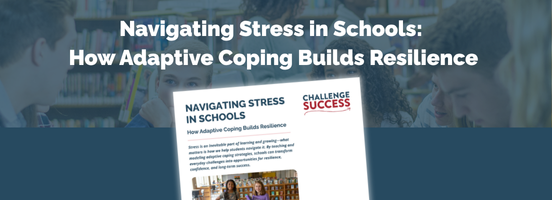This article was written in 2010 by Charlene Margot, current Chair of Challenge Success. Although four years have passed since this was originally posted, the ideas discussed are still relevant and we are excited to share this piece with our community.
“The concept of childhood, so vital to the traditional American way of life, is threatened with extinction in the society we have created. Today’s child has become the unwilling victim of overwhelming stress—the stress borne of rapid, bewildering social change and constantly rising expectations.”
When were these words written? If you are thinking they’re from a recent educational symposium or an address by U.S. Secretary of Education Arne Duncan, you would be wrong. The words are from 1981, written by then-controversial child psychologist and author David Elkind, Ph.D. What, we said? Our children hurried? How could that be when childhood in America is as sacrosanct as Mom’s apple pie and the 4th of July?
Because it was true. In 1981, when Elkind’s book The Hurried Child was first published, I was a preschool teacher at Bing Nursery School, the laboratory preschool for the Psychology Department at Stanford University. A newly-minted graduate with a B.A. in Psychology, I had just landed my first job: working as a teacher at Bing.
This was a few years before the publication of Elkind’s book, and I was excited to work with the ‘Bing kids,’ famous for their intelligence, curiosity, and unique way of looking at life. Our students were, after all, highly sophisticated four- and five-year olds!
Born of well-educated parents whose employers featured names like Hewlett-Packard, Stanford University, IBM and brand-new Apple Computer, these children had parents who were dedicated to the raising of their offspring. Only the best would do: If parental work schedules conflicted with drop-off and pick-up times, the kids arrived via au pair or taxi. They had dance lessons, violin instruction, tennis and tae kwon do, art lessons and more. These were truly the most enriched children ever to attend preschool.
And yet they were overscheduled…and lonely. I vividly remember one little girl sighing wistfully and saying, “I’m so busy that I never get to see my mom!” She was four years old. As parent conferences and home visit became increasingly difficult to schedule because of family work and travel schedules, we realized that precious daily parent/teacher conversations were being replaced by conversations with au pairs and caregivers. Since our students were very young, they often mistakenly referred to us – their teachers – as “Mommy.” Wishful thinking? We sometimes thought so.
So, what has changed in the last 30 years? Why are we still talking about our stressed-out, overscheduled, sleep-deprived students? Surely we can do better. As the documentary Race to Nowhere so accurately depicts, our students are under more pressure than ever before. What are we parents to do? The first step is recognizing that the problem is not new and understanding that pointing fingers and assigning blame (it’s the parents, the kids, the schools, the teachers, the ‘system’) only adds to the problem.
As a parent, I now find myself forced to ‘walk the walk’ rather than just ‘talk the talk.’ It’s one thing to talk about modeling a balanced life and setting reasonable goals for your child. It’s quite another to do so given the high-stake pressures of today’s academic world!
Education has changed, society has changed, and we have changed—now it’s time for all of us to take an honest look at the pressures and expectations we put on our children.
